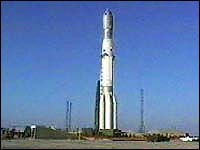|
Comparing Earth's Atmosphere with other planets
Measure Nearby Planets
Many scientists and governments express concern over how the composition
of the atmosphere will affect global temperature and weather patterns.
For example, if the average temperature increases by 10° F globally,
how will that affect agriculture and the food supply? What about changes
in weather patterns? Too much water = flooding, and too little water =
drought. Do humans contribute to this problem? Sure! Any increase in greenhouse
gases will increase the effectiveness of the atmosphere at trapping heat,
and industrial nations that burn fossil fuels (coal, oil, and gas) emit
carbon dioxide into the atmosphere in HUGE quantities every year. If the
temperature on Earth continues to rise, is there a possibility that we
could be making Earth too hot to like on? Is there any way we could “cool
off” the Earth, or make the increase in temperature more gradual and slow?
Perhaps if we look at how the Earth’s atmosphere compares with the atmospheres
of Venus and Mars, you will come up with some ideas about how atmosphere
and temperature can be brought into better control. Let’s check it out.
Let's go back to the activity where we measured the temperature,
pressure, and ozone of the atmosphere, only this time we'll send a probe
to other planets.
Interactive Lab

Launch a rocket similar to Russia's Mars-96 probe.
We learned about how Earth's atmosphere is heated, let's
see what it's like on other planets.
Interactive Lab

Click image for interactive comparison.
Now answer these review questions.
|